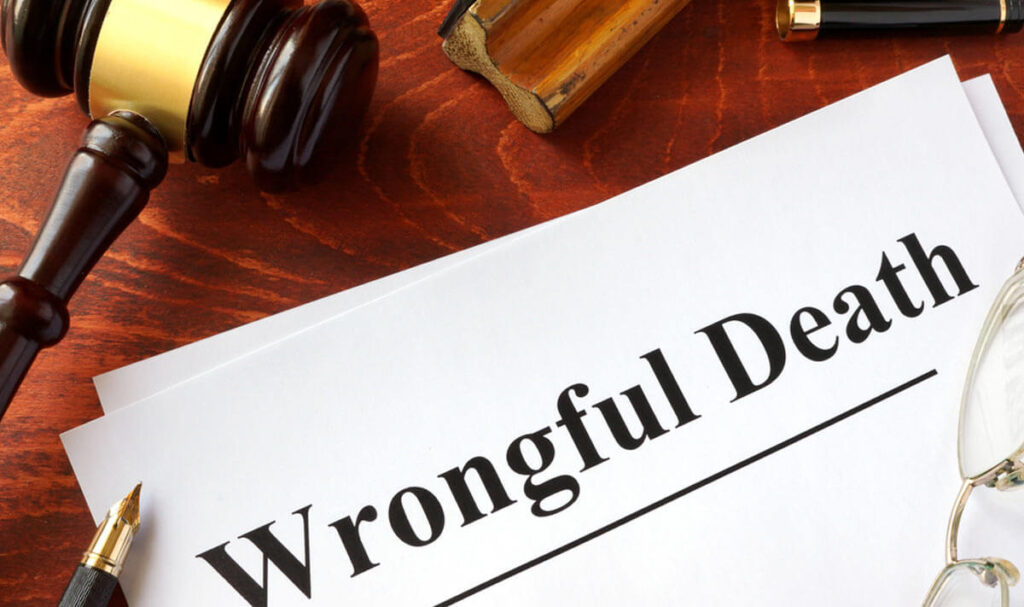Facing a Wrongful Death – Understanding Nevada’s Critical Legal Timelines
Losing someone due to another person’s negligence or wrongful actions brings devastating grief—and urgent legal deadlines you may not know about.
Nevada law sets strict time limits for filing wrongful death lawsuits. Miss these deadlines, and you could permanently lose your right to seek justice and compensation for your family.
The statute of limitations for wrongful death claims in Nevada is unforgiving. Insurance companies know these deadlines. The at-fault parties know them too. You should know them as well.
⚠️ CRITICAL DEADLINES
Nevada Wrongful Death: 2 years from death date
Start: Date person died (not accident date)
No extensions for not knowing the deadline
With 40 years of experience handling wrongful death cases, Jack Bernstein understands how overwhelming this process feels when you’re grieving. That’s why we’re here to guide you through Nevada’s legal requirements and help protect your family’s rights before time runs out.
Jack’s got your back—but only if you act within Nevada’s legal timeframe.
Understanding the “Statute of Limitations”: A Critical Legal Deadline for Your Nevada Wrongful Death Claim
A “statute of limitations” is Nevada’s legal deadline for filing a wrongful death lawsuit in court. Think of it as an expiration date on your right to seek justice through the legal system.
This isn’t about insurance claims or settlement negotiations. It’s about your window to formally file a lawsuit against the person or entity whose wrongful act, neglect, or default caused your loved one’s death.
What This Legal Time Limit Means for Your Family’s Case
The clock starts ticking immediately. Once Nevada’s statutory period expires, you cannot file a wrongful death lawsuit—even if you have overwhelming evidence and a clear case.
Here’s what you need to understand:
- Filing means court documents, not phone calls. Talking to insurance companies or attorneys doesn’t stop this clock
- The deadline applies to the lawsuit itself. You can still pursue insurance claims after the statute expires, but you lose your right to take the case to court
- No exceptions for strong cases. Even if negligence is obvious, missing the deadline typically means losing your legal remedy permanently
Bottom line: This deadline determines whether you can hold the responsible party legally accountable through Nevada’s court system.
Why Nevada Law Sets These Deadlines for Filing a Lawsuit
Nevada sets these deadlines to ensure fair trials while evidence is still fresh and to provide legal certainty for everyone involved. Understanding this helps explain why Nevada courts strictly enforce these deadlines.
Nevada’s Specific Time Limit for Wrongful Death Lawsuits: Don’t Miss the Deadline
Nevada law gives you exactly two years from the date of your loved one’s death to file a wrongful death lawsuit. This deadline is set by Nevada Revised Statutes § 11.190(4)(e) and is strictly enforced—meaning Nevada courts will almost always dismiss your case if you miss this deadline, regardless of the evidence or circumstances.
There are no extensions for not knowing about the deadline. No exceptions for strong cases. The two-year clock is unforgiving.
The Official Clock: When Does Nevada’s Filing Period Start for Wrongful Death?
The two-year statute of limitations typically begins on the date your loved one died.
Not the date of the accident. Not when you discovered what happened. The death date.
Example scenario: If someone is injured in a car accident on March 15th but lives for two weeks in the hospital before passing away on March 30th, the two-year clock starts ticking on March 30th—the date of death.
Rare exception: In very limited cases where the cause of death or responsible party was not immediately known, the statute may begin when the death is discovered. However, this “discovery rule” is uncommon and requires specific legal analysis.
Who Can File and Who is Bound by This Deadline?
Nevada law strictly defines who can file a wrongful death lawsuit. All eligible parties share the same two-year deadline—it doesn’t reset or extend for different family members.
| Eligible to File | Relationship to Deceased |
|---|---|
| Surviving spouse or domestic partner | Married or registered domestic partner |
| Children | Including adopted children |
| Parents | If no spouse, partner, or children survive |
| Personal representative | Of the deceased’s estate |
Important rules:
- One lawsuit only. Nevada’s “one-action” rule requires all eligible parties to join together in a single lawsuit
- Priority order. If there’s a surviving spouse or partner, they typically take precedence. If not, children can file. Parents can file only if no spouse, partner, or children survive
- Minor exception. If an eligible person is under 18, the statute of limitations is “tolled” (paused) until they turn 18, then they have two years from their 18th birthday to file
The Serious Consequences: What Happens if Nevada’s Wrongful Death Deadline is Missed?
Missing Nevada’s two-year wrongful death deadline typically means losing your right to seek compensation forever. The consequences are immediate and usually irreversible, no matter how compelling your case might be.
Courts don’t make exceptions for strong cases, sympathetic circumstances, or honest mistakes about the deadline.
Can Your Wrongful Death Case Be Denied if Filed Too Late?
Yes. Nevada courts will almost always dismiss cases filed after the two-year statute of limitations expires.
This happens through what lawyers call a “motion to dismiss.” The defendant’s attorney simply tells the court: “This case was filed too late under Nevada law.”
The court will typically:
- Dismiss your case immediately
- Not consider the merits of your claim
- Not examine evidence of wrongdoing
- Award you nothing, regardless of damages suffered
Real impact: Even if you have video evidence, witness testimony, and clear proof of negligence, none of it matters if you file too late.
Insurance Talks vs. Legal Deadlines: A Crucial Distinction for Your Claim
This is where families often get trapped. Insurance companies may continue negotiations, offer settlements, or request more information—all while knowing your two-year lawsuit deadline is approaching.
Critical distinctions:
- Insurance claims = No court filing deadline (though policies have their own limits)
- Lawsuit filing = Strict two-year court deadline that insurance talks don’t pause
Common dangerous scenario: An insurance company requests medical records, schedules examinations, or makes low settlement offers for months. Meanwhile, your lawsuit deadline passes. Once it does, they can simply refuse to negotiate fairly because you’ve lost your legal leverage.
Remember: Insurance companies are businesses. They’re not required to remind you about legal deadlines.
Are There Exceptions? When Nevada’s Wrongful Death Clock Might Be Paused (“Tolling”)
Nevada law does recognize limited situations where the two-year statute of limitations might be “tolled” (paused or extended). However, these exceptions are rare, narrowly defined, and highly complex to prove.
Don’t count on them. Most families cannot rely on these exceptions, and determining whether they apply requires immediate legal analysis by an experienced attorney.
Discovery Rule and Other Rare Exceptions: Why You Can’t Count on Them
The Discovery Rule
In very specific circumstances, Nevada’s two-year clock might start when the wrongful nature of the death or the responsible party is discovered—rather than on the death date itself.
Requirements are strict:
- The cause of death was not reasonably discoverable at the time it occurred
- A reasonable person in your position could not have discovered the relevant facts
- The discovery rule applies only to facts that couldn’t be found through reasonable investigation
Example hypothetical: If someone dies from what appears to be natural causes, but an autopsy months later reveals medical malpractice, the discovery rule might apply. However, proving this requires extensive legal documentation.
Other Limited Situations
Nevada law recognizes a few other tolling scenarios:
- Minors: If an eligible claimant is under 18, they have two years from their 18th birthday to file
- Fraudulent concealment: If the defendant actively hid their wrongdoing (extremely difficult to prove)
- Defendant absent from Nevada: If the responsible party leaves the state to avoid legal action
Bottom line: These exceptions are fact-specific, difficult to prove, and often litigated. They’re legal lifelines, not reliable planning tools.
The safest approach remains acting within Nevada’s standard two-year deadline.
Taking Action: How to Protect Your Family’s Rights After a Wrongful Death in Las Vegas
Time is your most critical resource. Every day that passes brings you closer to Nevada’s two-year deadline, and building a strong wrongful death case takes significant preparation within that window.
Don’t wait for insurance companies to act fairly. They know the deadlines. You should too.
Why Our Experienced Las Vegas Team Can Help You Navigate This Deadline
Jack Bernstein’s 40 years of experience handling Nevada wrongful death cases means understanding exactly how much time is needed to build your case properly.
What we do within your deadline:
- Immediate case evaluation to determine if you have valid claims under Nevada law
- Evidence preservation before witnesses disappear and records get lost
- Expert investigation to establish liability and document damages
- Medical record analysis to understand the full scope of wrongful conduct
- Legal research to identify all responsible parties and potential claims
Why acting promptly matters:
Evidence disappears. Witnesses move away. Medical records get archived. Security footage gets deleted. The strongest cases are built on fresh evidence gathered well before the deadline.
Our commitment to your family:
- Free, no-obligation consultation to discuss your specific situation
- Direct access to Jack Bernstein—not just junior associates
- Transparent communication about your case’s strengths, challenges, and timeline
- No upfront costs—we only get paid if we recover compensation for your family
You don’t have to face Nevada’s complex legal system alone. Understanding your deadline is just the first step. Building a case that honors your loved one’s memory and holds the responsible parties accountable requires experienced legal guidance.
Contact Jack Bernstein Injury Lawyers today to protect your family’s rights and explore your legal options while time remains on your side.
Conclusion: Understanding Your Timeframe is the First Step to Protecting Your Rights
Nevada’s two-year statute of limitations for wrongful death lawsuits is strict and unforgiving. Missing this deadline almost always means losing your right to seek justice through the court system, regardless of how strong your case might be.
The key takeaways for your family:
- You have exactly two years from the date of death to file a lawsuit
- Insurance negotiations don’t pause this deadline
- Rare exceptions exist but can’t be relied upon
- Acting promptly protects your legal rights and preserves crucial evidence
Don’t let time slip away while you’re grieving. Understanding these deadlines empowers you to make informed decisions about your family’s legal options. With the right legal guidance, you can navigate Nevada’s requirements and focus on what matters most—seeking justice for your loved one and securing your family’s future.

